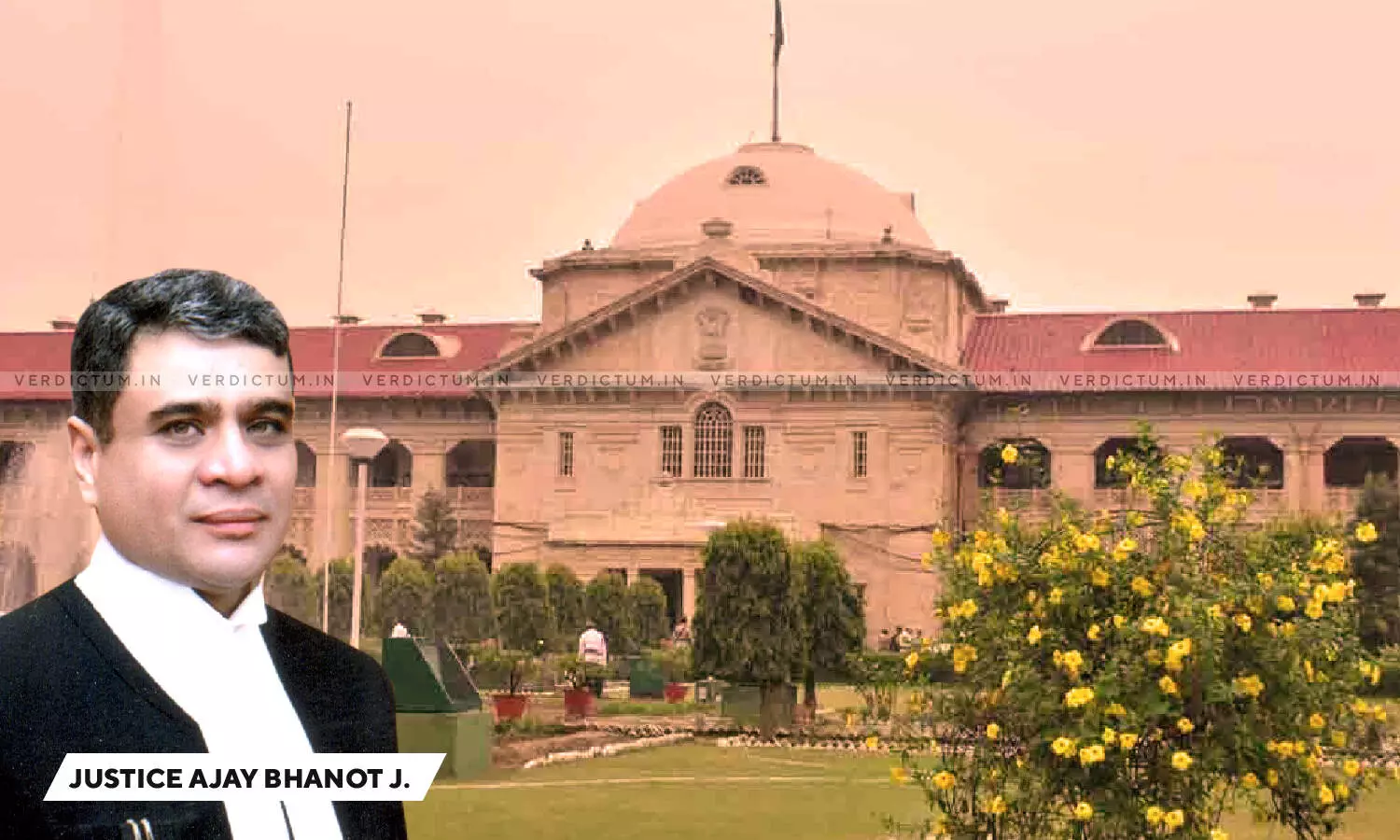
Justice Ajay Bhanot, Allahabad High Court
Family Disputes Cannot Frustrate Claims Of Eligible Family Member To Compassionate Appointment: Allahabad High Court
 |
|The Allahabad High Court considered a Writ Petition seeking appointment of the wife of the deceased on compassionate grounds without the requirement to produce a letter of relinquishment.
The Allahabad High Court has held that family disputes cannot frustrate the claims of an eligible family member to compassionate appointment, or deprive other dependents of the deceased of their entitlements to avail monetary benefits from such appointment.
The wife of the deceased contended that she was entitled to compassionate appointment without the relinquishment letter from the mother of the deceased.
The Bench of Justice Ajay Bhanot observed, “Compassionate ground appointments are expected to be processed smoothly and in an expeditious manner with the support and the consensus of all family members. However, family disputes or rival claims can delay the process of appointment on compassionate grounds. Family disputes cannot frustrate the claims of an eligible family member to appointment, or deprive other dependents of the deceased of their entitlements to avail monetary benefits from such appointment.”
Senior Advocate Siddharth Khare represented the Petitioner, Advocate Ajay Shankar represented the Respondent.
Case Brief
The Petitioner’s husband was a Single Window Operator in UCO Bank and passed away in 2024. The dependents of the deceased were wife, son and mother. Thus, the petitioner made a claim for appointment on compassionate grounds. There was an open discord between them over the appointment on compassionate grounds.
It was the case of the wife of the deceased that the Respondent Bank mandated her to produce a relinquishment letter by the mother of the deceased, however, she submitted that she was entitled for compassionate appointment without production of the said documents.
The mother of the deceased refused to issue the letter of relinquishment in favour of the wife of the deceased and the said documents are essential requirements to process the wife’s claim and in the absence thereof the appointment of the wife has been held up.
Court’s Analysis
The following were the two issues before the Court:
Whether the claim of the wife of the deceased for appointment on compassionate grounds can be declined on the footing that the mother of the deceased has failed to give the letter of relinquishment and has refused to execute other documents in her favour?
Whether the wife of the deceased is entitled to appointment on compassionate grounds? If yes, whether the interests of the mother of the deceased are liable to be protected while granting appointment on compassionate grounds to the petitioner and the manner in which the entitlements of her will be secured?
The Court discussed the rationale and purpose of appointment on compassionate grounds and held, “Compassionate ground appointments are a welfare measure taken by model employers to benefit the dependent family members of a deceased employee. The sole purpose of compassionate appointments is to enable the dependent family members to tide over the immediate financial crises caused by the death of the earning member...The nature of the compassionate appointments is such that they contemplate various relaxations to enable appointment of the eligible dependent without unnecessary hindrances.”
Further, the Allahabad High Court noted that family disputes cannot frustrate the claims of an eligible family member to appointment, or deprive other dependents of the deceased of their entitlements to avail monetary benefits from such appointment.
The Court emphasised on the duties of the employer in case of disputes regarding compassionate appointment. The Court observed that the employer has to initiate steps to realize the aim of compassionate ground appointments. An assessment of the comparative financial status, assets, liabilities, long term commitments and educational qualifications of the respective parties is the first step in such enquiry.
“After evaluation of the aforesaid factors, the process will culminate in the appointment of the most eligible dependent of the deceased which will also give maximum benefits to other dependents”, the Court added.
The Bench further emphasised that shared resources and distributive justice to ameliorate the financial penury of the deceased employee’s dependents inhere in the concept of compassionate appointments.
“Benefits flowing from a compassionate appointment are the common assets of all dependents and not the sole preserve of the appointee. The said assets are liable to be distributed equitably among all dependents and not appropriated exclusively by the appointee”, the Court said.
Furthermore, the Court noted that the wife of the deceased was the only eligible and most suitable candidate for appointment on compassionate grounds. The Court took into account the age of the mother of the deceased and her ineligibility to be appointed as clerk at UCO Bank.
Therefore, the Court directed the appointment of the wife of the deceased on compassionate grounds. It was also directed that 20% of the salary of the wife of the deceased would be deducted every month and deposited in the bank account of the mother of the deceased by the UCO Bank.
Accordingly, the Writ Petition was disposed of.
Cause Title: Naina Gupta V. - Union Of India & Ors. (Neutral Citation No. - 2025:AHC:118168)
Click here to read/download Judgment